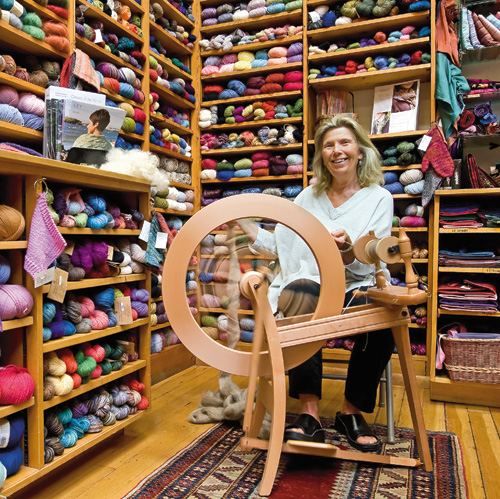 From Jackson Wellsprings to Pacific Domes, businesses built to serve a higher purpose and make a buck are moving into Ashland.
From Jackson Wellsprings to Pacific Domes, businesses built to serve a higher purpose and make a buck are moving into Ashland.
By Dan Cook
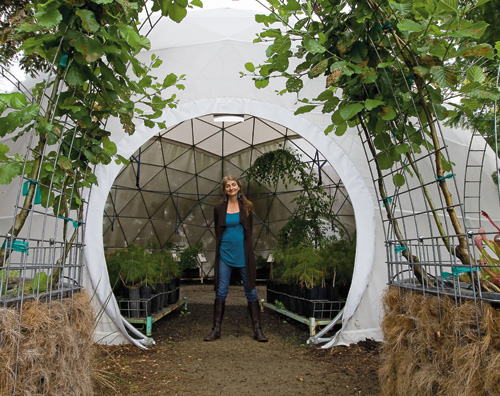 |
Asha Deliverance, founder of Pacific Domes, donated this geodesic dome to the city of Ashland for use as a science teaching facility. She frequently donates domes to causes in which she believes, although her priority is to ensure that Pacific Domes remains profitable.// Photo by Jamie Lusch |
Sweating, his back bent over a shovel, Dr. Gerry Lehrburger methodically works a small section of a sacred garden at the Jackson Wellsprings just north of Ashland. “Dr. Gerry,” as he’s known around the Wellsprings, is installing a huge irrigation system for the garden, part of his vision to create an eco-village on the property. In his day job he’s the emergency department physician at Ashland Hospital. He also greets the faithful at the Goddess Temple at the Wellsprings and manages the nearby ceremonial cleansing bath that he had restored last year.
At the opposite end of town, Asha Deliverance discusses an order for a new geodesic dome with a customer who’s purchasing one from her company, Pacific Domes. Pacific Domes is the world’s leading maker of geodesic domes. Customers include Nike, Disney, Donald Trump and scores of Burning Man devotees. Deliverance regularly donates her domes, which cost as much as $300,000, for relief purposes to those in need in places like Haiti, Honduras and New Orleans. She also donated a dome to serve as the Goddess Temple at Jackson Wellsprings.
As Lehrburger digs into Mother Earth and Deliverance sells domes, work progresses on an all-green-materials home on a hillside west of downtown Ashland. There, a crew of burly contractors works to construct the dwelling. They are all paying a company called EcoNest about $1,700 for the privilege of building this “living sanctuary” and learning the secrets of clay-straw-timber building. The homes sell for hundreds of thousands of dollars and are sustainable and ecological.
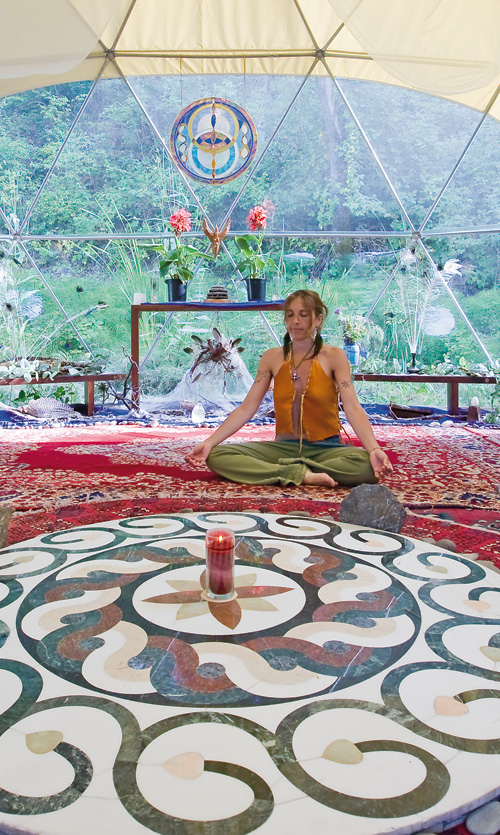 |
The Goddess Temple at Jackson Wellsprings was a gift from Asha Deliverance, who says, “They needed a temple, I make temples.”// Photo by Jamie Lusch |
Meanwhile, the partners in the Omah Foundation say they have closed a deal with the city of Ashland to provide high-definition video streaming to the city. Omah Foundation is an entrepreneurial Ashland-based startup that has a new technology for creating HD video channels. One of the partners operates a nonprofit that donates the technology to other nonprofits. The partners, who also have created their own spiritually inspired names, believe their technology will be in harmony with and help propel a growing worldwide spiritual renaissance. They also believe it will be the foundation of a very profitable Ashland-based company.
Ashland (population: 21,000) is best known for its summer Shakespeare Festival, and to a lesser extent as a small college town where students matriculate to Southern Oregon University. But behind all the wealth that flows into the community from the re-enactment of the Bard’s classics, another economy based upon spirituality, wellness and healing is gathering momentum, a classic business cluster effect.
From Jackson Wellsprings on the north end of town to Pacific Domes to the south, businesses have sprung up that serve a global customer base in search of a deeper meaning to life. Built to both serve a higher purpose and to turn a profit, spiritually aligned businesses in Ashland represent a very real and growing part of the town’s economy.
“Look around at what’s happening in the world today — constant warfare, a global economic crisis, environmental degradation on an unprecedented scale,” says Lehrburger. “Is it any wonder people are looking for something more meaningful? And if you have something to offer the community that is authentic … they are happy to pay for it.”
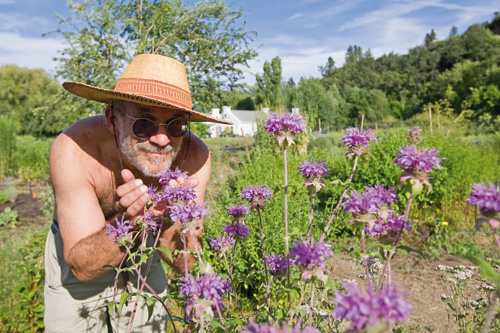 |
Dr. Gerry Lehrburger says his vision of a “sustainable, integrated, wellness-enhancing community” at Jackson Wellsprings is evolving as planned. The vast sacred garden created this year is one of the cornerstones of his demonstration community.// Photo by Jamie Lusch |
This flourishing community of New Age entrepreneurs isn’t just a loose collection of tarot card readers, yoga instructors and crystal sellers. Businesses whose owners say they are “spiritually aligned” run the gamut from makers of alternative dwellings to computer services, bike shops, restaurants, construction companies, spas and creative services firms.
These are people who may identify themselves as Buddhists, worshippers of the divine feminine (goddess worshipers), pagans, followers of some ancient Celtic or East Indian religious tradition, or simply as being in touch or tune with a cosmic unifying spirit. Their commercial objective may be to turn a profit, but their practices and products are designed to be in harmony with the universe.
In almost any other location, these spiritually aligned businesses might be considered on the fringe of the commercial spectrum. But in Ashland, they fit right in.
“My next-door neighbor is the publisher of the DailyOM” says Ashland Mayor John Stromberg, referring to an online publication devoted to spiritual news, advice and opinion. “We just don’t think anything about it. Those things are just kind of accepted as the norm around here.”
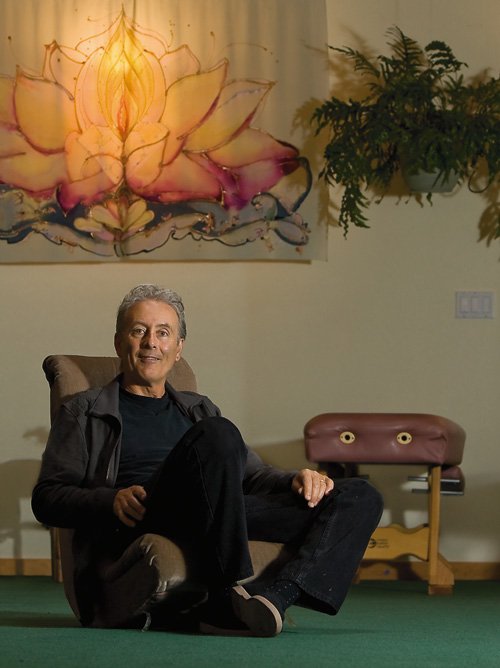 |
Will Wilkinson is the community fitness director at Hidden Springs Wellness Center and co-founder of the Southern Oregon TimeBank. The decade-old center is solidly in the black, he says.// Photo by Jamie Lusch |
Spiritually aligned business owners are well represented on the Ashland Chamber of Commerce’s membership list and play an important role in the local economy, says Katharine Flanagan, with the Ashland Chamber of Commerce.
“The alternative business sector is woven into Ashland’s economy and recognized in the full scope of the Ashland business community,” says Flanagan. “Ashland is very open and accepting of varying businesses, people, and ideas.”
The sheer number of business people in Ashland who say there is a spiritual component to their business plan suggests this niche employs hundreds of people, if not more. While putting an economic impact value on these businesses is virtually impossible, Flanagan says taken as a group they clearly make a substantial financial contribution to the town.
Flanagan says the Chamber doesn’t track businesses that claim to be spiritually aligned, but the number of green/wellness/health businesses in town that embrace “environmental stewardship while practicing economic and ecologically sound practices” is large and growing. As examples, she cites Ashland Food Cooperative, Dagoba Organic Chocolate, Standing Stone Brewery, Ashland Community Hospital, United Bike Institute and Yala Designs — all Chamber of Commerce members.
It does seem to be the sense of community that Flanagan cites that makes Ashland a magnet for businesses that are either spiritually aligned, or sustainably or ecologically minded. Many say they visited once or twice and felt “at home,” surrounded by like-minded people. Others say they were attracted by the combination of the climate, the geography and the richness of the land itself. Then, there are those who say they feel a spiritual kinship with the town.
“We were definitely drawn here,” says Dona Zimmerman, owner of the Web-sters, a wool and yarn store in downtown Ashland that she founded 28 years ago. Born and raised in Southern California, she was “looking for a different experience” for her children. While visiting friends in Ashland, “there was this house and someone said it might be for sale. It was offered to us, we bought it.” Now several houses later, the couple raises sheep on 50 acres. Some of the yarn and wool sold at Web-sters was sheared off those sheep.
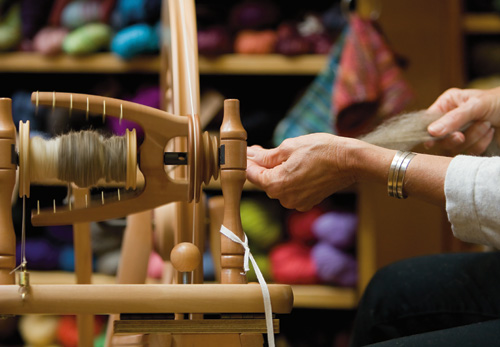 |
A spinner works her magic at Web-sters, a woolen goods shop in Ashland.// Photo by Jamie Lusch |
More recent migrants to town also speak of a “fatal attraction” syndrome.
EcoNest owners Robert Laporte and Paula Baker-Laporte both say they feel a oneness with the community in Ashland that they have long sought in their lives. They teach a construction method commonly used in Europe that dates back to ancient times. The technique is based upon sustainability as well as a signature clay-straw insulation process. Their homes are built without nails, use very little concrete and no toxic materials. Their method found immediate acceptance in Ashland, where both are busy teaching its principles to other builders and consulting on various homebuilding projects.
“I’ve lived in some beautiful places — Santa Fe, Salt Spring Island — but Ashland is different. I am never leaving Ashland. It is home,” says Baker-Laporte.
The internationally recognized author, lecturer, religion and spirituality scholar and teacher, Jean Houston, moved her business headquarters from New York City to Ashland in 2000. Her presence in the community adds an unmistakable film-star mystique to the local spiritual community. Everyone claims to be on intimate terms with this living legend of spiritual exploration. She too has one foot firmly planted in the business world. She consults with businesses who seek her help in bringing a spiritual, holistic element to their workplaces, and she leads tours of sacred locations around the world.
Houston and her business partner/husband, Robert Masters, built their empire, which included Foundation for Mind Research and the Mystery School, on the East Coast. Although Masters died in 2008, Houston has carried on their work in their new home in Southern Oregon. Houston and Masters encouraged many of their students and colleagues to relocate to Ashland, telling them that it was a spiritual “human potential hot spot” where they would be able to thrive.
“Are people being drawn to Ashland? Oh, heavens. Yes!” says her assistant, Connie Buffalo. “We are looking at how to build a new society, with spirit as a central part of it. It’s happening elsewhere, but in Ashland, people are really going off the grid to find a sense of meaning and purpose in the world.”
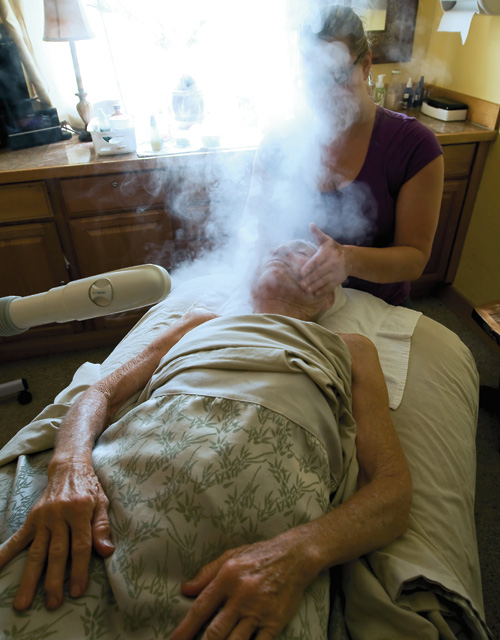 |
A client receives a treatment at the Hidden Springs Wellness Center.// Photo by Jamie Lusch |
Deliverance, another iconic Ashland figure, also relocated to Ashland, but much earlier. She left Santa Cruz, Calif., for Ashland three decades ago, founding Pacific Domes in 1980 “because I needed a way to make money.” She had sewn teepees previously and was attracted to the alternative dwelling business. Ashland felt spiritually welcoming to her, so she stayed. Now she’s become something of a spiritual networker around town.
“We have a network of save-the-world people here in Ashland, and more are coming,” says Deliverance. “We are the transition earth people. We are leading the way into a better future.”
Many of the entrepreneurs new to town would do well to study Pacific Domes’ strategy. Deliverance believes in philanthropy and is quick to respond to requests for emergency shelters — or Goddess Temples. But she tempers her charitable tendencies by keeping an eye on the bottom line.
“Bridging the two worlds of spirit and materialism is challenging,” says Deliverance. “I coach my sales team to be honest and direct, to sell domes, to collect payments and to abide by the contract.”
When the recession hit, Pacific Domes suffered just like everyone else, she says. The company had revenue of $4 million-plus in 2008, employed about 40 people and was experiencing double-digit annual growth before the recession. The global financial crisis hit Pacific Domes hard. Sales today are about $2 million, and employment about half of what it was. She says sales are now up again.
 |
Dona Zimmerman moved her family from Southern California to Ashland to raise her children in a healthier environment.// Photo by Jamie Lusch |
Deliverance complains about being tied to her computer and about the steady stream of messages that pour into her email account, but she willingly demonstrates how customers can easily navigate Pacific Dome’s site in search of products and corporate information. Her attachment to the wonders of the Internet underscores the crucial role the Web performs for Ashland’s New Age businesses.
These business owners and their key employees are extremely savvy about online community building and marketing. Many of these business people have worked in the world of Internet technology, and they have used those skills to find business partners and customers who share their spiritual quests. The Internet has allowed them to connect to a global market for their goods and services from Ashland.
The startup Yogi Tunes exists almost entirely online. Its co-founders use their connections with the world’s leading yoga instructors to aggregate yoga session playlists into an online music library. Alex King-Harris, who writes and performs mostly electronic music under the name Rara Avis, explains: “The No. 1 question every yoga instructor gets after class is, ‘How can I get a copy of the playlist you used during that session?’ Most of the time, they don’t have copies of them floating around — they change them frequently. Yogi Tunes solves the problem for them.”
Yogi Tunes created a website with individual pages devoted to each yoga instructor who is a site member. Not coincidentally, some of the music used by these instructors was written by Yogi Tunes’ co-founders, musicians who specialize in soundtracks for yoga teachers. The instructors’ favorite playlists are available on the site — for a price. All commerce is conducted through the site.
Several businesses have been created to connect the spiritual community. One is WebSpirit, which offers a directory of like-minded members in Southern Oregon. Its directory for Ashland alone lists nearly 100 businesses. Among them: Excalibur Computer Solutions, whose tagline is: “Your computer techs in shining armor.”
One can also join the online community Southern Oregon TimeBank where its 120 members exchange hours with each other for goods and services. For instance, co-founder Will Wilkinson “pays” his barber a fixed number of hours when she cuts his hair. These hours go into her TimeBank account. She can use them to purchase goods and services from other members — any member, not just Wilkinson.
TimeBank was created to give structure to the sense of community that was building within Ashland’s spiritual community, Wilkinson says. The ultimate goal is to do away with the tracking of hours and simply have members providing goods and services for one another out of a sense of community. “Dollars, hours — all those things are illusions. When people live in harmony, they get what they need from each other without keeping track.”
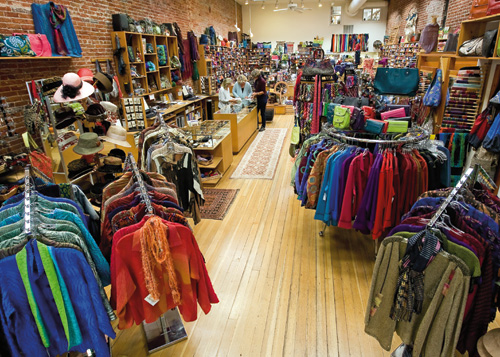 |
Zimmerman’s store, Web-sters, includes goods made from the wool from sheep raised on her family ranch in its colorful inventory.// Photo by Jamie Lusch |
Just as they have embraced technology as a way to propel their businesses, these New Age entrepreneurs have no problem talking about money. Until TimeBank concepts are ubiquitous, money is the accepted currency in the current age. The New Age entrepreneurs have got to pay the bills in this lifetime.
“We have thousands of clients here at Hidden Springs, people who feel like they belong,” says Wilkinson about the center, which was founded a decade ago. The graceful complex lies behind a fence overlooking a garden and spring-fed pond. The practitioners offer yoga, life counseling, fitness coaching, spa services, communications consulting, cleansing, spiritual guidance. Wilkinson, the fitness director for Hidden Springs, also makes his living as a ghost writer, communications consultant and life coach.
“People are willing to spend money to be treated with respect, and we show them that respect,” he says. “The bottom line speaks: We’re profitable, we’re doing our thing, and people are spending money on it.”
The need for financial security and the desire to settle permanently in Ashland motivated Yogi Tunes’ King-Harris to create a business plan, attract investors and launch the business in July. “My partners and I have done a lot of hard work, building our contacts in the yoga industry,” says King-Harris.
For years, he says, they wrote music, toured to support music sales, spent days in the studio recording their songs. Now, he wants to spend more time with his family in Ashland. “We are looking to live a good life, not one where we’re traveling all the time and spending days in the studio. To do that, we need money. What we have is a business model, with investors, not some pie-in-the-sky dream.”
As more of these New Age entrepreneurs find each other in Ashland, the economic ties that bind them to one another grow stronger. Several of them are already planning to hire EcoNest to advise them on new home construction. And back at Jackson Wellsprings, several partners are already in discussions about joining forces to launch a new spiritually inspired commercial project.
Asha Deliverance has proposed to the Wellsprings’ Gerry Lehrburger and Goddess Temple co-founder Graell Corsini that they build a geodesic dome village at the Wellsprings. Lehrburger would provide the land; Corsini’s priestesses could be the first residents of the domes; and Deliverance would have a demonstration model of what an all-dome village might look like elsewhere, thus spurring her dome sales. It’s the Ashland spiritual/economic network at its harmonic best, looking for yet another way to make ends meet in this lifetime while preparing for the next.
The business of spirituality
Ashland has a rich history of attracting individuals who feel free to practice their esoteric philosophical and religious beliefs there among kindred spirits. Inevitably, many have become part of the town’s commercial life. In addition to the myriad authors, artists and musicians who have long been part of the Ashland landscape, hundreds of individuals have hung out shingles as healers, wellness counselors, midwives, life coaches, yoga and related practitioner instructors, communications specialists and so on. Among them:
- Jumana King-Harris, a co-founder of the Goddess Temple of Ashland at Jackson Wellsprings, teaches water healing and writes a column for the DailyOM, a national publication based in Ashland. Her husband, Alex King-Harris, is a co-founder of Yogi Tunes who also earns money as a studio musician and live performer.
- Graell Corsini, co-founder of the Goddess Temple, is a midwife and teaches ecstatic dance and yoga at the Wellsprings when she isn’t supervising the operation of the temple with Jumana King-Harris. Husband Tony is a stonemason.
- Will Wilkinson, who founded a time-bartering service known as TimeBank, offers various life consulting services and also ghost- writes books. He is the fitness director at the Hidden Springs Wellness Center, which he says is solidly in the black 10 years after its founding.
- Alex Polinsky, a Hollywood actor who co-starred in the 1980s sit-com Charles in Charge, now splits his time between L.A. and Ashland. He does voice-overs for Warner Brothers in L.A., works on films with Sacred Mysteries Productions’ Jay Weidner and Sharron Rose in Ashland, and develops his own films from script to final edits in both locations.
- Peter DeJong is the owner of Sentient Construction. His work is based upon the principles he learned from EcoNest. Originally from New Mexico, he has permanently relocated to Ashland where he lives with wife Cara, a midwife who also serves at the Goddess Temple at Jackson Wellsprings.
These partnerships appear to be the most commonly occurring new businesses based upon the spiritual model. Included are several of the spiritually based bookstores and restaurants in town. Others include:
- Sacred Mysteries Productions. Jay Weidner and Sharron Rose moved to Ashland from Port Townsend, Wash., in search of a more meaningful existence. They are currently filming in and around Ashland. Rose is forming an artistic dance troupe, using local performers, some of whom also work in Shakespeare Festival productions.
- Yogi Tunes, the partnership founded by three musicians who create play lists for yoga instructors, projects revenue of $8 million to $10 million by its third year.
- EcoNest, a dwelling design and construction company, is another wife-and-husband founded firm that builds spiritually aligned homes using ancient building methods that lead to dwellings with all natural materials, natural heating and cooling and overall “healthy” construction methods.
- Omah Foundation was founded by three entrepreneurs who relocated from various places to Ashland to be part of what friend and mentor Asha Deliverance refers to as the “save-the-world” movement that merges science and spirituality. Their high-definition video-streaming product is based upon a military technology one of the founders co-developed while in the Marine Corps.
Far fewer in number, these businesses offer support to the start-ups, often partnering with them on projects. Among them:
- Pacific Domes, founded in 1980, has weathered many spiritual and economic storms over the years and seems positioned for new growth.
- Jean Houston’s empire employs many people globally in the many businesses that Houston’s dynamic partnership with the late Robert Masters birthed.
- The Ashland Food Co-op is the hub of much of Ashland’s spiritual as well as culinary activity.
A new age mecca rises from a 1950’s trailer park
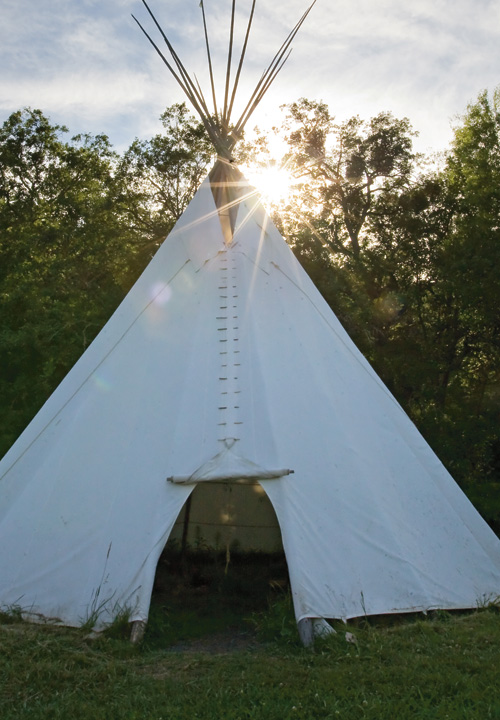 |
The sun peeks over the corner of a teepee located at Jackson Wellsprings.// Photo by Jamie Lusch |
How to categorize Jackson Wellsprings? It’s a demonstration community focused on health and healing that incorporates commerce, music, art, meditation, sacred teachings and practices into a sustainable, self-contained, wellness-enhancing community.
Dr. Gerry Lehrburger is the principal owner and operator of the Wellsprings. In his vision, people will live at the Wellsprings, work at the Wellsprings, eat food produced at the Wellsprings, heal themselves physically with herbal remedies derived from herbs grown at the Wellsprings, and heal themselves emotionally and spiritually with the healing waters of the Wellsprings and through the healing services offered by those who come to the Wellsprings to teach and practice their healing arts.
It’s an ambitious project, no doubt about it. But given the land’s history, and Lehrburger’s patience and persistence, odds are the vision will become reality.
The property is a lush flood plain of some 30 acres, the land enriched over the eons each time nearby Bear Creek overflowed its banks. According to local Native American lore, ancient tribes considered the land sacred. But when Lehrburger bought it, its primary use was as a trailer park, and not a lovely one.
Lehrburger, a Colorado native, came to Ashland in 1980 to practice emergency room medicine. He and an investment partner bought the Wellsprings with the idea of removing the trailers and redeveloping the land to a higher use. His master plan was blocked by a flood and zoning regulations. But as he came to know the property, the vision of a sustainable community became clear to him.
He had the natural springs spa and pool that already had a clientele. There was a community room in need of repair. The trailer park produced revenue. But the headaches that came with it offset its financial value.
Viewed from another angle, however, commercially disparate elements represented untapped resources. “When Wellsprings was purchased in 1995, we inherited a mobile home and RV park, namely an unintentional community,” says Lehrburger. “Over the years, residents have been invited to participate in the Wellsprings’ transformation toward an intentional community.”
He says those activities include farming, construction and environmental restoration. On any given day, one sees the trailer park residents at work at any number of jobs on the property.
In addition to the workforce, Lehrburger oversees a variety of commercial enterprises at the Wellsprings. He has a built-in customer base — those who use the spa, pool and community room. He has rich bottomland that produces food and medicines. He has plenty of land for festivals.
Operating in the black is important to Lehrburger, but not as important as creating something of a higher value than can be measured in dollars. Lehrburger set out to mold the Wellsprings into a spiritually based community. “The Wellsprings is one big sandbox, an ashram where participation and self-discovery are encouraged … and where the community can practice the teachings of the ancient ones,” he says.
As the pieces of his plan were falling into place, a pagan priestess contacted him. Graell Corsini founded a spiritually based community center in Mount Shasta. She told Lehrburger she’d had a vision instructing her to establish a new worship center in Ashland. Would he donate space at the Wellsprings for a Goddess Temple devoted to the worship of the Divine Mother? He instantly agreed to her request. Lehrburger says he believes the Wellsprings can best be developed with the aid of female partners in the process.
“Our mission is one of environmental restoration and of healing. As a rule, women seem to be more finely attuned to the needs of the Earth,” he says.
Once in Ashland, Corsini met Jumana King-Harris, another Goddess worshiper. They agreed to co-manage the project and in 2010 set about building the temple.
Enter Asha Deliverance, Ashland’s ultimate spiritual networker. She agreed to donate one of her Pacific Domes for the temple. The temple co-founders attracted a small army of goddess worshippers and others to Ashland to assist with the construction, dedication and operation of the temple.
The Wellsprings faces challenges to its evolution, both from potential floods and county regulations. Lehrburger says negotiations with county officials have not yet led to a solution that would protect the land from the next flood. But Lehrburger and the priestesses at the Goddess Temple believe they have a higher power on their side than the Jackson County Commissioners.

